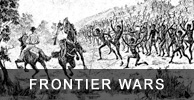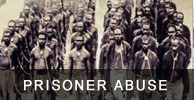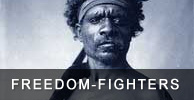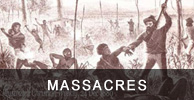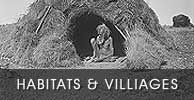Historian shines a light on the dark heart of Australia's nationhood
Henry Reynolds says the frontier war - his term for the violent dispossession of First Nations peoples - raises questions of global importance about the ownership of an entire continent

Photograph: NewSouth Books
Paul Daley theguardian.com 10 March 2014
As a student at school and university in mid-20th century Hobart, Henry Reynolds received a conventional education in Australian history.
Which is to say he learnt absolutely nothing about the violent dispossession of Aboriginal and Torres Strait Islanders after European settlement in 1788 - events he has referred to unambiguously in his controversial writings as "frontier war".
Reynolds - today a professorial fellow at the University of Tasmania after half a century spent probing the dark recesses of Australian colonial settlement and posing discomfiting questions about continental sovereignty - uses his own awakening to illustrate what he calls the "great absence" in modern Australia's narrative.
"Of course, I learnt nothing at school at all about the whole situation of frontier conflict and warfare," he says. "Generally speaking there was nothing in the curriculum that would have taught you this.
"Tasmania was a bit different in that there was an awareness of the Black Line [the farcical attempt to round-up the Aboriginal Australians in 1830] and the settlement [where they were later sent to be "christianised"] on Flinders Island. But if you wanted to find out more ... in the 50s and 60s many of the major historians published histories of Australia and there was almost nothing in them about it.
"In retrospect it was quite obvious that from the late 19th century until the 1960s the whole Aboriginal experience had really been written out of Australia's history."
In 1964, having taught in schools in England and Australia, Reynolds was in his mid-20s when arrived in northern Queensland to establish the Australian history program at Townsville University College (today's James Cook University). The textbook at the core of his course was the multi-authored Australia: A Social and Political History, edited by the eminent Australian historian Gordon Greenwood.
Reynolds describes Greenwood's 1955 tome, perhaps the most widely read text on senior high school and university reading lists at the time, as "a good book".
But the longer he taught the more he became immersed in the social fabric of his college and his new town, which had a significant and growing Indigenous population. The stories of extreme violence on the Queensland and other pastoral frontiers - as Aboriginal Australians clashed with settlers and experienced reprisal massacres from vigilante groups, native police units and troops - were a revelation.
"The small number of students I had in two small courses - they all knew because they had come out of that [Townsville] community and so many of them had come from places smaller than Townsville and they'd grown up with the whole question of race relations in Australia," Reynolds says. "So in a way the answer was brought home to me because of where I was.
"The extraordinary thing was that as I became every day aware of the whole question of Indigenous Australians ... there was nothing in the book. I mean, the Aborigine didn't even make the index. They weren't in the history."

Henry Reynolds | 256 pages | ISBN 1742233929
So the young academic sought out the reviews that accompanied publication of the Greenwood book. Most had been written by historians whose work was not included the book.
"They were pretty favourable but not a single one of them saw that there was something missing in the history. So the whole profession was complicit in this silence."
It is a damning critique of his own profession, some of whose members continue to strike back at Reynolds and other historians of the left (not least Stuart Macintyre) whose scholarship is criticised by conservatives as typifying a "black armband" view of Australian history.
By "black armband" - a term coined by the Australian historian Geoffrey Blainey and later used by the former prime minister John Howard - the critics refer to a desire to place undue emphasis on unsavoury and violent aspects of Australian history at the expense of the positives of European settlement.
In the late 60s academics and students at Townsville began scrutinising the colonial records and studying the Indigenous oral histories of the frontier. But Reynolds says the big public awakening to the cultural narcolepsy on frontier violence and the censorship of Australian history came with the 1968 Boyer lectures of the anthropologist Bill Stanner, titled After the Dreaming.
"He's the one that said, 'Look there's something completely wrong, there's a conspiracy of silence among historians,' I think as he put it, 'they are looking out on the landscape through windows which have been carefully placed not to see this important part of Australian history.'"
Regardless, the issue that was at the centre of the so-called culture wars less than a decade ago is becoming (thanks to the academic work of Reynolds and others including John Connor and Marilyn Lake, and a few journalists) a mainstream rather than marginal question that is central to Australian national identity.
Perhaps there is no clearer sign of this than the non-fiction award in the Victorian premier's literary awards that was bestowed on Reynolds in January for his 2013 book Forgotten War. In that work he makes the strongest case yet that frontier violence constituted a war between European settlers and troops and the Indigenous first inhabitants.
Victoria's Liberal premier, Denis Napthine, described Forgotten War as "a very important book for Victorians and Australians".
In it Reynolds strengthens the progressive argument that at least 2,000 to 3,000 settlers, police and soldiers, and 20,000 Indigenous Australians, died in colonial conflict (these figures are, he writes, conservative).
The research of Reynolds and others leaves no doubt that the colonial governors and military subordinates considered their conflicts against the original inhabitants part of a "war" (Indigenous history is replete with stories of Aboriginal "warriors" who fought each other and the settlers).
While Forgotten War is the latest of Reynolds's dozen or so books that explore relations between European settlers and Australia's Indigenous people, he does not regard bringing this important story to light as his life's work.
"I see myself as an interpreter of Australian history who was confronted with the realities of race as the great absence," he says.
"There's still very deep arguments about why it [the violence] happened and how significant it was and what we should do about it, but I think there is - even amongst those that try and oppose [acknowledging] it - there simply is such a large amount of information out there for anyone seeking it. There's also been a lot of very good curriculum material for schools."
Despite the growing awareness since the 50s about the dark heart of Australian nationhood, there is still enormous room for cultural enlightenment.
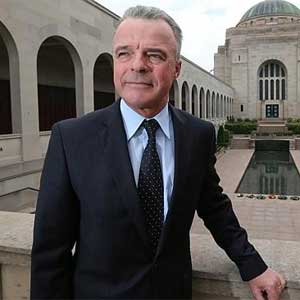
Former Howard Govt MP Brendon Nelson said that First Nations Frontier War will not be represented at the Australian War Memorial under his watch
Image: www.warwickdailynews.com.au
Reynolds has been a long-time agitator for the Australian War Memorial to acknowledge frontier conflict in its exhibits - something the memorial's director, Brendan Nelson, insists will not happen under his watch.
In 2010 Reynolds and Lake published What's Wrong with Anzac? The Militarisation of Australian History. It dared challenge perhaps the greatest shibboleth of Australian cultural identity - the Anzac legend - and questioned the way political leaders have contorted Australian military history to suit their nationalistic ends. They are themes that will reverberate through Australia's four-year festival of commemoration for the first world war.
"Anzac 100", the federal government's $140m-plus commemoration program, almost guarantees that frontier war will not be a commonwealth speaking point until at least 2019. Unless of course it forms part of the national conversation around Tony Abbott's determination to acknowledge the first Australians in the constitution.
Precisely how that acknowledgement is made is one of the legal questions that now preoccupies 75-year-old Reynolds.
"Is it just going to be 'we acknowledge them because oh yes they were here before us'? Or is it going to be 'because of course they had sovereignty', which has never been determined in an Australian court, as I think it must eventually be," he says, referring to the 1992 high court judgment which overturned terra nullius but did not acknowledge Aboriginal sovereignty.
"Then the conflict becomes infinitely more significant because it is about those great geopolitical issues - and that is what makes what happened a war too.
"It's not just about the killing and how it was done, where it was fought or over what period of time. It was conflict about these great issues, issues of global importance - the sovereignty and the ownership of a whole continent.
"It seems to me to raise those fundamental questions - which the Australian judicial system has said we can't deal with this, our courts were set up as a result of the claim of sovereignty by the British, we can't go behind that decision. It's a bit of a copout. I think if the high court won't do it I just think what has to be done is that Australia should be forced to go into the international court of justice for an opinion."
Reynolds may be done with evidencing frontier war. On that front Forgotten War will probably, he says, be his "last word".
"On the question of constitutional recognition ... I will certainly write something about that," he says.

